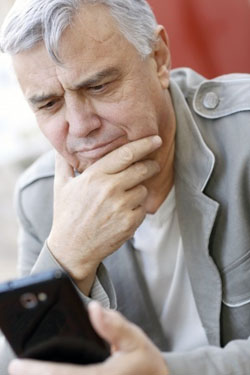
Health care is one of the most immediate concerns for the family of a senior who lives independently. This is particularly true for older adults who have breathing difficulties like chronic obstructive pulmonary disorder (COPD) or asthma, a history of unstable heart conditions like atrial fibrillation or high blood pressure, or require close diabetes management.
Remote monitoring and regular in-home nursing visits are excellent failsafe services, but they can be expensive. To that end, some companies are working on making day-to-day monitoring more simple and affordable.
It's not hard to imagine every independent senior one day having a handheld, comprehensive scanning device— that can automatically check vitals everyday— in the medicine cabinet. And that day may be fast approaching, if Azoi, Inc., has anything to say about it.
An iPhone-based vitals monitor?
Electronics company Azoi has developed a new sensor package to monitor life signs. It's called Wello, and it fits inside a specialized iPhone case. Delivering reliable readings of the body's critical functions at a glance, Wello is designed to be easy for the average person to use.
Using sensors along the lateral edges and dorsal surface of the case, Wello measures temperature, pulse, and blood oxygen saturation. It has a spirometer attachment to measure the force of the user's exhalation (which can be used to measure lung capacity and function)— an especially valuable test for A COPD sufferer who is feeling short of breath.
Azoi even purports that Wello will be able to take blood pressure readings and a rudimentary EKG (test of the electrical function of the heart). A person with cardiac disease might be able to detect early warning signs of a heart attack and thus get to the hospital sooner. Such increased lead time could lead to better medical outcomes for preserving later heart muscle function after an acute attack. It could even be lifesaving.
For doctors, Wello's most valuable function may be the sensor package's ability to sync up with application software that will log in each readout a person makes with the device. This should allow medical practitioners to see changes in the patient's disease course over time—which is historically the most difficult information to obtain from interviewing patients directly, but most critical to a doctor's understanding of what is happening in a patient's body.
And Azoi isn't the only tech entrant into the future care market.
Another company, Proteus Digital Health, was received FDA to conduct trials on a "smart pill" system, called Helius, in 2012.
Helius is a tiny sensor embedded into a pill that is powered by a bio-battery charged by the body itself. When a patient swallows a Helius-enabled pill, the sensor activates and transmits data to a smartphone app. It logs the time the pill was taken and measures the patient's physiological response to the medicine.
Again, because information about how symptoms and treatments progress over time is extraordinarily valuable to a doctor's ability to effectively treat patients, smart pills may soon become a standard diagnostic test. Measuring responses to a medication in real-time could allow a physician to make more accurate "tweaks" to a patient's dosing regimen, to detect adverse drug interactions or allergic responses in progress and counteract them, to prescribe more effective taper-off courses for habit-forming medicines and to monitor improvement in a patient's symptoms.
Helius could even be used to monitor a compliance with prescription regimens.
While seniors don't always mismanage their medications, they are a patient population prone to noncompliance which can cause further medical problems. But with Helius' synching feature, an automatic record can be made of a patient's dosing, which will allow doctors to determine if a patient has been taking medicine correctly.
The technologies aren't always widely available yet, but one day they might be.
As medicine is constantly evolving, trying to become safer and more effective, hi-tech solutions like Wello and Helius will inevitably become more commonplace.
Though it remains to be seen just how medically reliable the information Wello provides will be, the idea is sound. In the future, we may see additional handheld scanners that could change senior care. Imagine blood sugar monitors that require no finger sticks— or even ketone detectors— to help hard-to-manage diabetics. Or a sensor that could detect changes in electrolyte levels just from a person's sweat?
We're not there yet, but we're getting closer.











